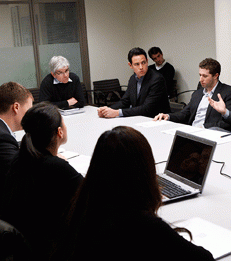Build Possible


We have all these hard facts, but in the end it's really just a tool for the imagination.
Three MBA students discuss their participation in the Stern Consulting Corps, working with Professor Paul Romer:
“We saw an opportunity,” first-year MBA student Zeev Krieger recalls of his decision to work with Benjamin Wise, Alice Yeung and several fellow NYU Stern MBA students on a Stern Consulting Corps (SCC) project with Professor Paul Romer and his colleague Brandon Fuller. During the spring 2012 semester, the students were tasked with developing a business plan for a new reform-oriented city in Honduras, based in part on Professor Romer's notion of a charter city.
The students’ work ties to Professor Romer’s new research center at Stern, the Urbanization Project, which is focused on urban growth and governance in the developing world. The Honduran city, known locally as "La RED," is an entirely new concept, and the students understood that their business plan would have direct bearing on policy decisions in Honduras. “La RED” is a special reform zone with its own administrative systems and laws. Because the zone will have a high-degree of autonomy, the city will be free to adopt rules that create a more favorable environment for residents, businesses and investors. “This city is a brand new slate,” Alice explains. “It’s an opportunity to build a brand new culture, a brand new norm.”
The students initially planned to approach the project in a tightly structured way, conducting research and case studies from which they would build to reach their deliverables, but Professor Romer encouraged them to move out of their comfort zones: “His idea was that we start from the most macro level for understanding a city, and then build specifics under that. He told us, ‘Don't worry about understanding anything; just use your intuition,’” Krieger recalls. “It was a challenge to figure out how to work in an unstructured style for business school students whose mandate is structure. There was some creative destruction. It forced people to come up with ideas and new paths.”
The students developed new ways of thinking as they brainstormed, collaborated and conducted research, and their initial struggle to navigate within the ambiguity gave way to a changed mindset. Yeung observed transformations in her personal work style: “I'm a quantitative person and tend to focus in on all the small details. But I learned to step back and take a look at the bigger picture. I learned it's helpful to get all of the ideas out on the table. You miss so much if you don't do it.” The project opened Wise’s eyes to the open-ended opportunities that exist for MBAs: “A project like this reinforces the fact that business school is not an either/or proposition. You don't have to go down a set path to be a basket-weaver or an investment banker. You can let processes inform each other.”
Over the course of the semester, the students developed narrative-based descriptions of potential scenarios and outcomes, infrastructure estimates and policy briefs which are already being applied. Some of the students’ initial findings were presented in a meeting Professor Romer conducted with Octavio Sanchez, chief of staff to the Honduran president, and Professor Romer plans to use the students’ work as he continues to advise the Honduran government. “We have all these hard facts,” Wise says, but they are intended to act as a base for what comes next. “In the end it's really just a tool for the imagination.”
Professor Paul Romer and the Urbanization Project are no longer involved in the Honduran government's reform zone project.
